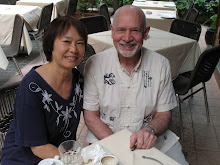It is now a year since Mariko received her stem cell treatment at XCell-Center in Germany. I apologize for not keeping you informed on a periodic basis over the course of the past year as promised. I'm not sure if that was due only to laziness on my part, or if the apparent lack of results from her stem cell treatment contributed. Perhaps some of each. Nevertheless, my perceptions of the results are summarized below.
My “gut” feeling is that the stem cell therapy as carried out by XCell Center was not effective. It appears to be a “one-size-fits-all” type of therapy, which begs some serious questions in the first place as to its chances of success. Most neurologists we talked with also considered the probability that the stem cells could transport themselves from the region of implantation to the area of the brain that they would be needed as unlikely. Bottom line—I think the probability that this procedure would be considered fraudulent in the U.S. is fairly high.
It should be noted, however, that Mariko and I read the same blogs, the same advertisements, the same medical information, and the same research reports, and we typically came up with different conclusions regarding the probable efficacy of the type of stem cell therapy they were performing in either China or Germany. It is difficult to say whether I would have been as positive (hopeful) about the procedure as she was if I were the one with the disease. In the end, it had to be her choice, and I was as hopeful as she, even if I remained more skeptical.
In all fairness, however, one can never be sure to what degree it might have had some positive effect because one can never completely assess the ongoing degenerative nature of the disease. It’s possible it slowed the disease, though that can’t be determined one way or the other. She was evaluated by a physical therapist before and after the therapy (4 times total), and the results there, too, were inconclusive. The data never showed a clear improvement; rather, they seem to have indicated an overall steady deterioration, although there were some flip-flops among some of the individual tests.
Additionally, the Center’s general unwillingness to share what I considered valid, up-to-date statistical information with us became suspicious, as well as their apparent unwillingness to supply us with an unedited, unbiased network of those who had received the treatment (though we acknowledge there will be some privacy issues that need to be taken into consideration). Moreover, there appears to be little follow-up on their part to gather information that might lead to valid statistics regarding the efficacy of their treatments. For example, we have never been contacted again by the Center asking us for any information regarding the effect of the treatment, perceived by us or documented by medical professionals.
My “gut” feeling is that the stem cell therapy as carried out by XCell Center was not effective. It appears to be a “one-size-fits-all” type of therapy, which begs some serious questions in the first place as to its chances of success. Most neurologists we talked with also considered the probability that the stem cells could transport themselves from the region of implantation to the area of the brain that they would be needed as unlikely. Bottom line—I think the probability that this procedure would be considered fraudulent in the U.S. is fairly high.
It should be noted, however, that Mariko and I read the same blogs, the same advertisements, the same medical information, and the same research reports, and we typically came up with different conclusions regarding the probable efficacy of the type of stem cell therapy they were performing in either China or Germany. It is difficult to say whether I would have been as positive (hopeful) about the procedure as she was if I were the one with the disease. In the end, it had to be her choice, and I was as hopeful as she, even if I remained more skeptical.
In all fairness, however, one can never be sure to what degree it might have had some positive effect because one can never completely assess the ongoing degenerative nature of the disease. It’s possible it slowed the disease, though that can’t be determined one way or the other. She was evaluated by a physical therapist before and after the therapy (4 times total), and the results there, too, were inconclusive. The data never showed a clear improvement; rather, they seem to have indicated an overall steady deterioration, although there were some flip-flops among some of the individual tests.
Additionally, the Center’s general unwillingness to share what I considered valid, up-to-date statistical information with us became suspicious, as well as their apparent unwillingness to supply us with an unedited, unbiased network of those who had received the treatment (though we acknowledge there will be some privacy issues that need to be taken into consideration). Moreover, there appears to be little follow-up on their part to gather information that might lead to valid statistics regarding the efficacy of their treatments. For example, we have never been contacted again by the Center asking us for any information regarding the effect of the treatment, perceived by us or documented by medical professionals.
I hope the above information hs been helpful, though I realize it may not have been what you were hoping to hear. Please feel free to either write or call if you would like additional information. We are always willing to share whatever information we might have.
